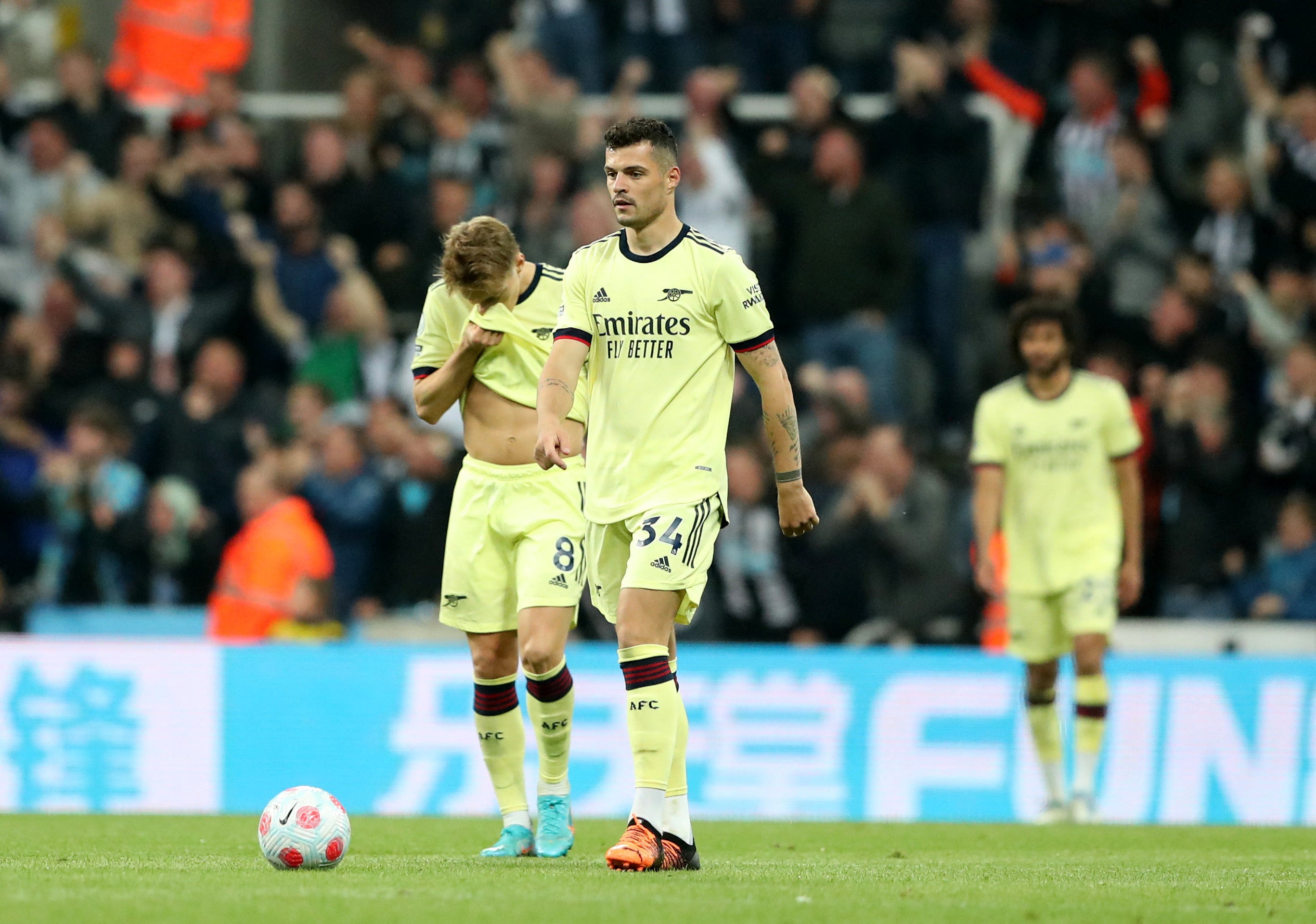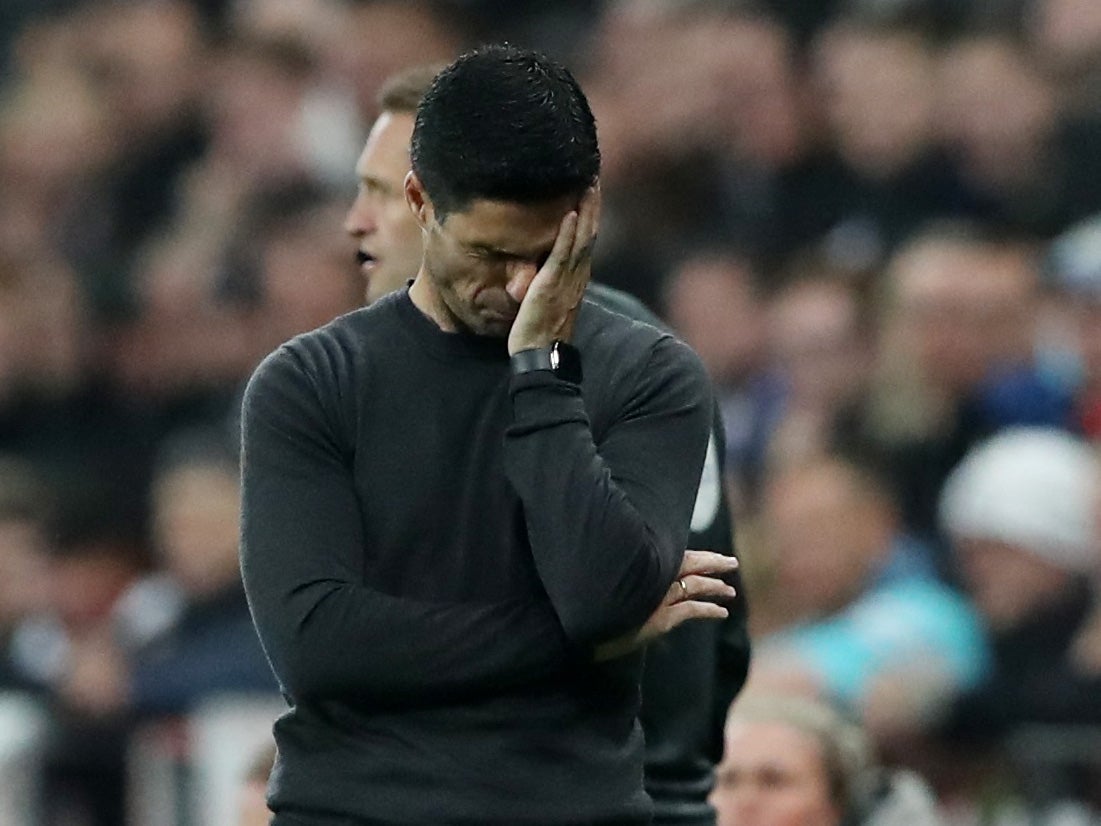Arsenal left with regrets after Mikel Arteta takes revolutionary streak too far
The Gunners were outplayed and outfought by Newcastle to leave their top-four hopes in ruins

Your support helps us to tell the story
From reproductive rights to climate change to Big Tech, The Independent is on the ground when the story is developing. Whether it's investigating the financials of Elon Musk's pro-Trump PAC or producing our latest documentary, 'The A Word', which shines a light on the American women fighting for reproductive rights, we know how important it is to parse out the facts from the messaging.
At such a critical moment in US history, we need reporters on the ground. Your donation allows us to keep sending journalists to speak to both sides of the story.
The Independent is trusted by Americans across the entire political spectrum. And unlike many other quality news outlets, we choose not to lock Americans out of our reporting and analysis with paywalls. We believe quality journalism should be available to everyone, paid for by those who can afford it.
Your support makes all the difference.There can be a cold, clinical air to Mikel Arteta that makes him a suitable man to deliver an autopsy. Sadly for him, it was the post-mortem of a performance that all but ended Arsenal’s hopes of a top-four finish.
The inquest into a season that promised more than it will deliver is beginning. Arteta began the probe into a terrible night. “We were nowhere near the level to play in the Champions League,” he said. “Newcastle were 100 times better than us in every department from the beginning to the end.” If that involved an element of exaggeration, perhaps not much of one.
What would have been an irrelevant game, had Arsenal beaten Tottenham, instead became the biggest match of their season and brought their worst performance of the campaign. Other nights have showcased their strengths, seeming to symbolise the Arteta revival, highlighting the merits of training-ground passing patterns and trusting in youth. This was a 90-minute snapshot of their weaknesses. In a campaign where errors and injuries have often threatened to undermine progress, they looked too callow, lacking the kind of dominant personality who could have driven them through.
Questions about their mettle persist. They can respond to some setbacks – bottom after the first three games of the season, they reached the top four, only to slip out of it – but not all and not always swiftly. They have only procured four points from losing positions. They can veer from seemingly auspicious winning runs into successive setbacks. They have had three consecutive defeats in August and April, two apiece in December and now May.
They have lost 15 games this season and scored in just four of them. Goals are a wider issue for the eighth-highest scorers. Arteta may have borrowed from his mentor Pep Guardiola’s blueprint; for a while Arsenal compensated brilliantly for a lack of specialist strikers by conjuring more from a phalanx of technical midfielders and wingers. But when Emile Smith Rowe, Gabriel Martinelli and Martin Odegaard lost their scoring touch, they became over-reliant on Bukayo Saka.
Another problem is that Alexandre Lacazette has just two goals in 17 league games, both of them penalties. Pierre-Emerick Aubameyang, on the other hand, has 13 goals for Barcelona. Arteta’s decision to exile a striker with 301 in his club career at the time looked justified. Now it may feel a gamble too far, when a pragmatic compromise for four months might have made the difference.

Maybe Arteta took his revolutionary streak too far. Arsenal probably needed a purge, but maybe not one approached with Stalinistic zeal. The culture of the cull resulted in too many departures, some serving no obvious purpose and bringing in little money. They may have got Champions League football if they had simply kept Ainsley Maitland-Niles and Calum Chambers, unglamorous figures but versatile players who could have plugged gaps in recent weeks when, at various points, Cedric Soares, Nuno Tavares, Rob Holding and Albert Sambi Lokonga have been found wanting.
Arsenal have been stretched. Arteta seemed intent on navigating the second half of the season with 12 players he could trust. The loss of Kieran Tierney and then Thomas Partey were the beginning of the end; take each out and Arsenal lacked top-four quality at left-back and at the base of midfield. They have lost 45 per cent of matches Partey did not start this season and 40 per cent when Tierney did not.
They might be faulted for the one-sided nature of their winter dealings: too many outgoings and no incomings left them short-staffed, but through choice more than enforced austerity. “We have done what we can and what we are allowed to do and what we can do,” said Arteta. “The team we were able to build is the same team that has taken us all the way here.” But it was a team, not a squad.
And, while he offered a reminder that few tipped them for the top four nine months ago (and still fewer when they were effectively playing a 35-game season after going pointless in the first three), they were Europe’s biggest spenders last summer. They bought for the future but, in Wenger-esque fashion, just when the future seemed set to arrive, it was put back a year.
This became their chance, fashioned in part by last year’s failings. They spent £150m, had a free run without European football and no complications from cup competitions after January. Plotting a path into the Champions League next season may be harder. Arteta the footballer took a pay cut because he wanted to play in it, leaving Everton for less money at Arsenal 11 years ago. Arteta the manager has his new contract but, barring a Tottenham collapse at Norwich, not the achievement to mark it with. Instead, he was the pathologist, surveying what seemed the painful death of a top-four challenge.
Join our commenting forum
Join thought-provoking conversations, follow other Independent readers and see their replies
Comments